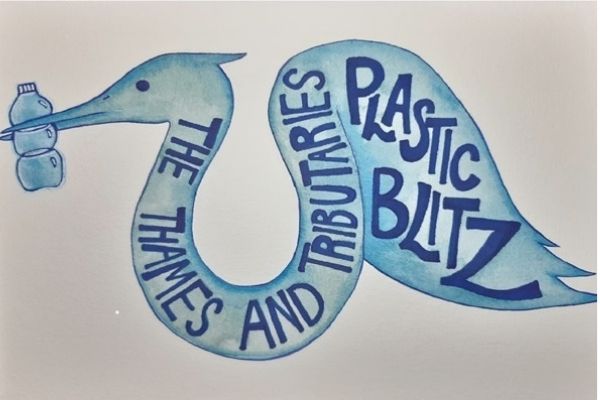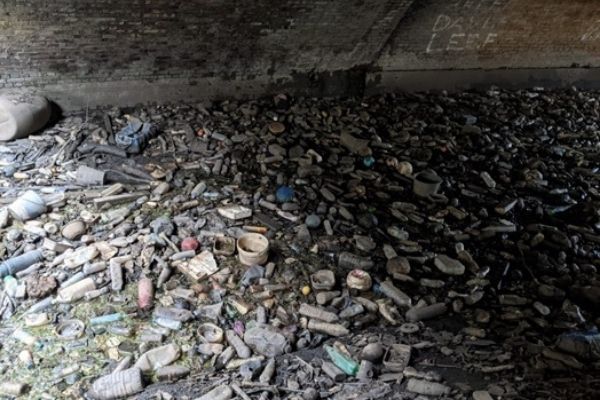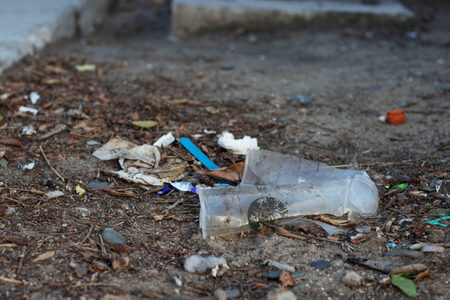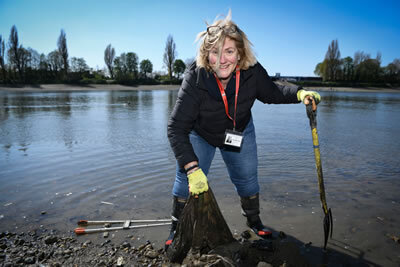2024
Make a Difference - with thanks to author Ann of Barnes Tidy Towpath Group
Want to make a difference? Here are some easy ways:
- Participate in Putney Tidy Towpath Group's local efforts via this website
- Use a milkman to switch from plastic milk bottles to glass: try findmeamilkman.net
- Only flush Paper, Pee and Poo down the loo! Otherwise, you are adding to the microplastics problem in our waterways
- Visit Recycle Now for info on whether an item can be recycled in our area, an explanation of recycling symbols, interesting tips on recycling & recycling contamination. Generally speaking, it is safer to take recycling home to avoid the risk of recycling contamination often found in public recycling bins.
- Try some simple household substitutions:
- take your own reuseable travel mug to the coffee shop
- use refillable water bottles -now dishwasher safe
- purchase loose fruit & vegetables, not pre-packed, and ask your grocer to switch to paper bags instead of offering film
- buy items packaged in cardboard, not plastic (e.g., switch to powder laundry detergents)
- all things being equal, purchase the item with less packaging
- use cardboard cotton bud sticks
- try washable flannels instead of wet wipes
- avoid products containing microbeads (tiny balls of plastic found in facial wash, toothpaste, body scrub)
- be careful not to let disposable contact lenses go down the drain as they can harbour bacteria harmful to marine life
- use a "bag for life" and always have one in your purse, pocket, car...
- replace plastic straws & plastic cutlery with metal ones
- use an empty, tin mints package as a discrete and portable ashtray to hold cigarette butts when out and about (Smints tins can be found online; be careful not to get the plastic containers!)
- think about the plastics you purchase regularly and challenge yourself to eliminate one item completely from your shopping
- Support Thames21
- Read Thames21's newly released report Plastic Pollution in the Tidal Thames
- Follow Sky's Ocean Rescue campaign and #passonplastic
- Help facilitate use of refillable bottles with the return of water fountains: #OneLess
Thames21 Survey Results:
Between the start of 2015 and December 2017, Thames21 volunteers conducted 102 detailed litter surveys to uncover the type of litter present in the Thames. The survey method was developed in partnership with Marine Conservation Society to help address the lack of evidence on how much litter is entering the river, how it is getting there, and what impact it might be having. Key findings are:
- The top 10 items (excluding unidentified objects) found by volunteers on the Thames foreshore accounted for 80% of all the litter counted, providing a clear list of items to target:
- Cotton bud sticks: A ban on plastic cotton bud sticks would complement the voluntary action already undertaken by some retailers.
- Bottles and their tops: A Deposit Return Scheme will be introduced later this year, the Government announced in March, subject to consultation. These schemes have very effectively tackled this litter problem in many countries. Still mineral water bottles account for 45% of this category, by far the single biggest bottle type. As such, bringing more water fountains into operation would facilitate greater use of refillable water bottles as seen at the 2018 Wimbledon Tennis Championships.
- Plastic glasses/cups from pubs: These should be replaced with reusable, hard plastic glasses as has been done at Glastonbury.
- Wet wipes are not necessarily the most common item on the foreshore but they collected in concentration in certain of the areas surveyed. Wet wipes are often flushed down toilets and later found in high numbers on the foreshore, presenting a massive environmental problem.. Urgent action is needed to improve the packaging to detail proper disposal instructions (No wipes should be called flushable!) and to educate the public about its plastic content. The Government has pledged a ban on the continued manufacture of this product using plastic.
- Top 10 items found:
- Wet wipes (18%)
- Food wrappers (17%)
- Cotton bud sticks (13%)
- Drinks bottles and tops (10%)
- Unidentified plastic >25mm (10%): excluded microplastics and unidentified polystyrene as too small/numerous to count
- Take-away containers (7%)
- Straws (2%)
- Building insulation pieces (2%)
- Cigarette butts (1%)
- Cigarette packaging (1%)
2023
Great news - new group starting in Battersea this year! We are so excited to share the news that there will be a litter collection group forming to collect the litter from Old Swan Wharf on Battersea Church Road - if you know anyone in the area who would be interested in joining a group there please share the news - to find our more email Sam
We are so excited to share the news that there will be a litter collection group forming to collect the litter from Old Swan Wharf on Battersea Church Road - if you know anyone in the area who would be interested in joining a group there please share the news - to find our more email Sam  batterseabeachclean@gmail.com
batterseabeachclean@gmail.com
We will be there on the morning of Thursday 23rd March so email us putneytt@outlook.com if you are interested in joining us.
April 2022
The Thames and Tributaries ‘Plasticblitz’
Thames21 has joined forces with the Environment Agency and Rotary in the Thames Valley to call on volunteering, community and environmental groups to come forward to sign up to take part in a mass cleanup of plastic waste from the Thames and its tributaries between the 17th and 25th of September 2022. Participating groups will also be asked, where possible, to collect data on the types of plastic pollution they find during their events, allowing us to build an evidence base on the extent to which plastic is threatening our rivers. This data will feed into the EU-wide ‘Preventing Plastic Pollution’ Project.
 Logo design: Jess Whittick
Logo design: Jess Whittick
Plastic pollution is a serious and growing problem within our rivers. Plastic waste threatens wildlife through ingestion and entanglement, and slowly breaks down into tiny plastic fragments (microplastics) which can work their way into the food chain.
Once plastic enters our rivers, there is no statutory obligation for any organisation or public body to remove it. This has resulted in plastic waste being allowed to accumulate in our rivers where it can then be carried out to sea. Shockingly, 80% of plastic pollution found in the sea has passed through rivers and streams on its way there. Many of our rivers are therefore effectively acting as plastic ‘taps’, allowing a constant stream of plastic from inland areas to flow into the sea.
Throughout the Thames basin, there are numerous community groups, river action groups and Environment Agency teams already working hard to remove plastic waste from their local river. The Thames and Tributaries Plasticblitz is an annual citizen science event that aims to join these groups up to take part in a simultaneous mass clean-up of the Thames and its tributaries between the 17th and 25th of September. The participating groups are asked to record what types of litter they are encountering, allowing us gain an idea of what the most problematic items are, and where plastic ‘hotspots’ are forming.
 Extreme volumes of plastic pollution collecting on the Alders Brook, East London.
Extreme volumes of plastic pollution collecting on the Alders Brook, East London.
The Plasticblitz concept was trialled last year to great success. In total, 17 teams from a mix of Environment Agency and community group backgrounds took part. Between them, these groups carried out 26 litter picks across the Thames and its tributaries, spanning from Gloucestershire to Teddington. In total, 139 bin bags were filled and more than 6,500 items of waste were catergorised, with 72% of this waste made of plastic.
The challenge is on to beat these figures in 2022!
The 2022 Plasticblitz will take place between the 17th and 25th September. Groups will upload their results to the live StoryMap, which will include details of each participating team, as well as a league table showing which teams collected the most bags of litter. This StoryMap will also give a live breakdown of what items have been collected across all groups.
Click here to see the 2022 Thames and Tributaries Plasticblitz StoryMap!
Sign-up!
You can now register to take part in the 2022 Plasticblitz! Any group which is covered by their own public liability insurance and risk assessment is invited to take part. This could include (but is not limited to) community groups, Thames21 River Action Group, Rotary Clubs, small independent businesses, religious groups, canoe/kayak clubs, youth groups, school groups and sea cadet/scout groups. Participating groups are responsible for organising and running their own event and do so under their own risk.
November 2022
Putney MP Fleur Anderson fighting to ban plastic in the 11 billion wet wipes used in the UK every year.
Fleur Anderson MP’s Bill to prohibit the manufacture and sale of wet wipes containing plastic will have its first reading on Tuesday 2nd November and has support from fellow MPs and organisations such as the Marine Conservation Society, Thames 21, Thames Water, the Green Alliance and the WWF.
Fleur Anderson, MP for Putney, said:
“As a mother of four children, I completely understand the pressures that parents are under and the difficulties that can bring when trying to cut down on plastic and make the right choices for the environment.
“I know that parents want to do the right things and all I am saying is that we can make it easier on them and on everyone who relies on the use of wet wipes every day.
“Everyone should bin and not flush wet wipes, but either way they contain plastic which gets in the environment and kills wildlife. My Bill comes in the same week as world leaders are meeting for COP26 and will show that the UK can take serious action and ban plastic from wet wipes made and sold in the UK.”
The disposal of single-use, non-degradable wet wipes is a growing problem and is a leading cause of harm for our water systems and our marine environments. 90% of the astonishing 11 billion wet wipes that are used in the UK every year contain some form of plastic. That is 163 wet wipes for every person in the UK every year. The plastic in wet wipes breaks down into microplastics, which can be ingested by marine and riverine animals, and are entering into our food chain and water supply. The environmental damage caused by plastic waste is causing an ecological disaster with 100 million marine animals dying each year from plastic waste alone.
Wet wipes are also behind 93% of blockages in UK sewers and are even changing the shape of our rivers as they pile up on beds and banks. The Thames Water area alone has on average 85,000 blockages a year due to fat and wet wipes. In 2018, Thames21 retrieved over 5000 wet wipes from the Thames bed during an operation on a 116m stretch of the river.
Not only is it possible to manufacture wet wipes without plastic, non-plastic alternatives are on the market already. There are bamboo fibre wipes, plant-based wipes, organic cotton wipes and washable re-usable cloths. Holland and Barratt recently became the first shop on the high street to introduce a complete ban on the sale of all wet wipe products and plan to replace them with environmentally friendly and sustainable alternatives.
In January 2019, the UK water industry published their ‘Fine to Flush’ specification in response to an increasing number of products being labelled as flushable, but which could still potentially cause blockages in the sewer system. However, a recent 2021 update to a survey conducted by the Marine Conservation Society in November 2020, found that only two out of ten main UK retailers has ensured that all of their own brand flushable wet wipes meet the ‘Fine to Flush’ specification. Of the other eight retailers, only four have committed to doing so by the end of 2021
Fleur Anderson continues:
“There are so many different types of wet wipes for sale but the labelling is really confusing. It really isn’t easy to determine which wet wipes contain plastic and which are ‘fine to flush’. There will be thousands of people out there right now using wet wipes every day with no idea that they are using a single-use plastic and with no idea of the harm that it is doing to our water systems and our marine environments.
“Flushing the odd wet wipe may not seem like a big deal but I don’t think people realise the scale of the problem. Just one sewage station in East London removes 30 tonnes of wet wipes every day. In 2019, 23,000 wet wipes were counted and removed from a single stretch of the Thames foreshore in just two hours. That is even more terrifying when you consider that our reliance on wet wipes is growing day by day.
“It isn’t just causing environmental damage and polluting our marine environments, it is also costing water companies around £100 million per year to clear 300,000 blockages. That is money that then ends up on our water bills each month.
“It has been years since DEFRA announced it would target plastic-containing wet wipes in its bid to eliminate all avoidable single use plastic within 25 years. Well, it’s COP26 this week and the Environment Bill is going through Parliament. This is the perfect opportunity to make good on that promise. Let’s ban plastic in wet wipes once and for all.”
A spokesperson for the Marine Conservation Society said:
“The UK Government needs to ban plastic from wet wipes to further reduce our reliance on single use plastic and to prevent wet wipes from adding to the plastic soup in our seas”
Debbie Leach, CEO of Thames 21, said:
“Wet wipes made with plastic are contaminating our rivers and clogging our drains. They are building up in heaps on the River Thames foreshore, and the plastic in them could be devastating to wildlife in the river. We should never, ever flush a wet wipe – and our message to decision makers is that all wet wipes that contain plastic should be banned.”
A spokesperson for the WWF said:
“Banning all avoidable single use plastic by 2025 would force companies to develop new products that don’t fill our oceans with waste that never disappears. We can become the generation that changes our flushaway culture and begins to restore nature instead of destroying it, but we need government policy to lead the way.”
April News
Hotham School Year 1. Litter collection
On Tuesday 2nd April, Year 1 pupils at Hotham School, had their REAL Project outcome to respond to the question, ‘Is one person’s trash, another person’s treasure?’
The children joined forces with their parents and representatives from ‘Putney Tidy Towpath’ to go down to the riverside and collect any rubbish they could find.
The hour collection was a great success, the group of over fifty pupils plus adults was split in two. One group tackled the towpath from Beverly Brook to Barn Elms Boat House, the other group headed east to tackle the litter on the new hard by the boat clubs on the Embankment. They cleared a four large bags of rubbish from the riverside, including small pieces of plastic which can be very damaging for wildlife.
Afterwards, the children and their parents went back to Hotham School for tea and cake and an exhibition of all the children’s work from the project. This included an information leaflet about the journey of the Thames, instructional posters about litter picking and a large mural of river prints.
Sandi, co-founder of the Putney Tidy Towpath Group said: "The morning was a great experience - the children all so well behaved and took the issue of litter very seriously. We hope that they found it fun and yet informative - they were all and hopefully will carry on being #litterheroes."
Year teacher Becky Krawczyk said: "The children are still talking about the litter pick and how much they enjoyed it! Lots of the parents commented on how great it was to discover there was an organisation who work so hard to keep the towpath tidy and were really pleased to be involved in some way!"
Badged Group Status Awarded.
In early April Sandi and Paul attended and passed Thames21 Training to be able to lead groups of volunteers down onto the Thames foreshore.
Many thanks to Thames21 for the excellent training course and to Tideway for their financial assistance in helping us reach this important objective.
Team Work With Fulham FC To Fight River Litter
They say that the sun shines on the righteous and if there is any truth in that then Fulham foreshore had a bunch of very righteous people on it yesterday (10th April). Organised by Fulham FC and managed by Thames21 a charity that is 'the voice for London’s waterways, working with communities to improve rivers and canals for people and wildlife'. Fulham neighbour and co-founder of Putney Tidy Towpath, Sandi Bloomfield, joined the group “to see how the Fulham foreshore differed on the other side of our stretch of the river”.
After a health and safety briefing from AJ McConville of Thames21 the volunteers and Thames21team set off through Bishop's Park to the steps down to the foreshore. A stretch to clean was set out between two cages supplied by the Port of London Authority (PLA) which into which the bagged litter was placed for barges to remove at high tide.
Sandi said: 'I was shocked by the difference - there were thousands of wet wipes and sanitary products, intertwined with plastic waste, fishing nets, ropes and plenty of clothing, whereas Putney's foreshore there are few wet wipes and mainly plastic rubbish, such as bottles, broken polystyrene and earbuds sticks.'
A.J McConville from Thames21 was surprised by the litter they found in the area: 'We haven't been to this site for 10 years and the type of litter is very different. We were picking up traffic cones and shopping trolleys, not 1000's of wet wipes.'
Poppy Flint from Thames21 commented: 'What is alarming is how it can look clean from the walkway above the river. It isn't until you look closely that you realise the scale of the problem; tangled masses of wet wipes and sanitary towels covered in silt. These will be breaking down into micro plastics which will be washed into the sea with the tides.
'The people taking part today were horrified by the extent of it. There were pledges never to flush wet wipes again and great conversations about what actions individuals can take. One person said all school students should take part in an event like this to truly understand that when we throw something 'away' it has impact somewhere else'.
It won't be another ten years before the next clear up outside Fulham FC, a spokesperson for Fulham FC commented: "The river clean-up along the foreshore at Craven Cottage involved many volunteers from our community including representatives from a leading waterways charity, Thames 21, Fulham FC Foundation and Club Partner, Buxton. We thank all participants for giving up some of their spare time. It was a worthwhile exercise and helps to sustain and improve our local environment and we look forward to hosting similar events in the future."
©Simon Dael for the photos.

